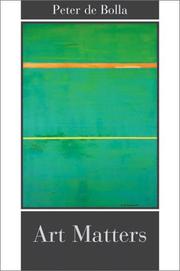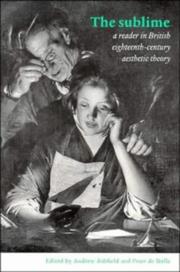| Listing 1 - 8 of 8 |
Sort by
|
Book
ISBN: 0631161732 9780631161738 Year: 1989 Publisher: Oxford : Blackwell,
Abstract | Keywords | Export | Availability | Bookmark
 Loading...
Loading...Choose an application
- Reference Manager
- EndNote
- RefWorks (Direct export to RefWorks)
Philosophical anthropology --- Aesthetics --- anno 1700-1799 --- Great Britain --- Aesthetics, British --- Individualism --- Sublime, The --- Esthétique britannique --- Individualisme --- Sublime --- History --- Histoire --- 82.01 --- -Aesthetics, British --- -Individualism --- -Economics --- Equality --- Political science --- Self-interest --- Sociology --- Libertarianism --- Personalism --- Persons --- Aesthetics, English --- British aesthetics --- English aesthetics --- Esthetica --- -History --- -Esthetica --- -82.01 --- 82.01 Esthetica --- -82.01 Esthetica --- Esthétique britannique --- Economics --- Sublime, The - History - 18th century. --- Aesthetics, British - 18th century. --- Individualism - History - 18th century.

ISBN: 0674006496 Year: 2001 Publisher: Cambridge [etc.] Harvard University Press
Abstract | Keywords | Export | Availability | Bookmark
 Loading...
Loading...Choose an application
- Reference Manager
- EndNote
- RefWorks (Direct export to RefWorks)
Newman, Barnett --- Aesthetics. --- Arts --- Philosophy.
Book
ISBN: 9781009263610 1009263617 9781009263580 9781009263603 1009263560 1009263579 1009263587 Year: 2024 Publisher: Cambridge ; New York Cambridge University Press
Abstract | Keywords | Export | Availability | Bookmark
 Loading...
Loading...Choose an application
- Reference Manager
- EndNote
- RefWorks (Direct export to RefWorks)
Book
ISBN: 9780823254392 Year: 2013 Publisher: New York (N.Y.) : Fordham university press,
Abstract | Keywords | Export | Availability | Bookmark
 Loading...
Loading...Choose an application
- Reference Manager
- EndNote
- RefWorks (Direct export to RefWorks)
"The Architecture of Concepts presents a new history of ideas. Using digital archives to track the historical formation of the concept of human rights across the Anglophone eighteenth century, it argues that a better understanding of the architecture of the concept will enable us to deliver on its universal aspirations"--
Human rights --- Civil rights --- Liberty. --- Literary criticism --- Political science --- History. --- General. --- Political Freedom & Security --- Civil Rights.
Digital
ISBN: 9781009263610 Year: 2024 Publisher: Cambridge Cambridge University Press
Abstract | Keywords | Export | Availability | Bookmark
 Loading...
Loading...Choose an application
- Reference Manager
- EndNote
- RefWorks (Direct export to RefWorks)

ISBN: 0521395828 9780521395823 9780511620409 9780521395458 Year: 1996 Publisher: Cambridge: Cambridge university press,
Abstract | Keywords | Export | Availability | Bookmark
 Loading...
Loading...Choose an application
- Reference Manager
- EndNote
- RefWorks (Direct export to RefWorks)
The concept of the Sublime has influenced aesthetic and theoretical debate ever since it was first widely invoked in the eighteenth century. However, the unavailability of many crucial early texts has resulted in a conception of the Sublime often limited to the definitions of its most famous theorist Edmund Burke. Andrew Ashfield and Peter de Bolla's valuable anthology, which includes an introduction, and headnotes to each entry, now offers students and scholars ready access to a deep and complex tradition of writing on the Sublime, many of them never before reprinted in modern editions.
Sublime, The --- History --- Sublime, The - History - 18th century

ISBN: 9780521395823 9780511620409 9780521395458 0521395453 0521395828 131603965X 0511620403 Year: 1998 Publisher: Cambridge, England : Cambridge University Press,
Abstract | Keywords | Export | Availability | Bookmark
 Loading...
Loading...Choose an application
- Reference Manager
- EndNote
- RefWorks (Direct export to RefWorks)
This collection of texts on the Sublime provides the historical context for the foundation and discussion of one of the most important aesthetic debates of the Enlightenment. The significance of the Sublime in the eighteenth century ranged across a number of fields - literary criticism, empirical psychology, political economy, connoisseurship, landscape design and aesthetics, painting and the fine arts, and moral philosophy - and has continued to animate aesthetic and theoretical debates to this day. However, the unavailability of many of the crucial texts of the founding tradition has resulted in a conception of the Sublime often limited to the definitions of its most famous theorist Edmund Burke. Andrew Ashfield and Peter de Bolla's anthology, which includes an introduction and notes to each entry, offers students and scholars ready access to a much deeper and more complex tradition of writings on the Sublime, many of them never before printed in modern editions.
Sublime, The --- History --- Arts and Humanities --- Literature
Book

ISBN: 1611486769 1611486750 1611486777 9781611486766 9781611486759 9781611486773 Year: 2015 Publisher: Cranbury Bucknell University Press
Abstract | Keywords | Export | Availability | Bookmark
 Loading...
Loading...Choose an application
- Reference Manager
- EndNote
- RefWorks (Direct export to RefWorks)
This collection of essays by scholars of the law and literature movement explores the place of the passions in English law of the eighteenth and nineteenth centuries. While some of the essays elucidate the forces of emotion in legal texts, others consider the representation of impassioned jurisprudence in literary texts. Together these essays provide insight into the foundations of modern juridical thought.
Law --- Law and literature. --- History. --- Literature and law --- Literature
| Listing 1 - 8 of 8 |
Sort by
|

 Search
Search Feedback
Feedback About UniCat
About UniCat  Help
Help News
News